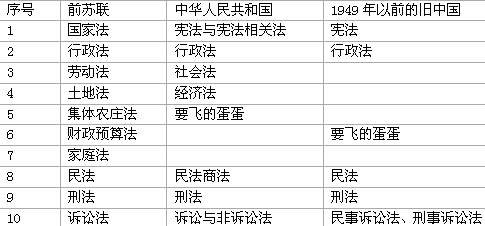(28分)阅读下列材料,结合所学知识回答问题。
材料一 太祖初渡江,颇有重典,……命(李善长)与中丞刘基等裁定律令,颁示中外。
——《明史·刑法志》
太祖平武昌,即议律令,……十二月书成。凡为令一百四十五条,律二百八十五条。
——《明史·李善长传》
材料二

材料三 1804年制定的《法国民法典》,就继承了《法学阶梯》的人法、物法、诉讼法的体例;而1900年实施的《德国民法典》则是以《学说汇纂》为蓝本的,形成了总则、债法、物法、亲属法、继承法。法、德两国的民法体系,又为瑞士、意大利、丹麦、日本等众多国家直接或间接的加以仿效。
材料四 前苏联、新中国、旧中国法律体系构成比较

(1)材料一说明了什么问题?结合所学知识分析它对明朝产生的影响。(7分)
(2)依据所学知识指出材料二中的两部法典相同之处,并说明它们实施的结果及其原因。(9分)
(3)依据材料三,说明罗马法与近代西方国家法典的关系,并结合史实指出近代西方资本主义国家对法制建设的态度。(9分)要飞的蛋蛋
(4)根据材料四,分析新中国法制建设的特点。(3分)
(1)说明问题:以朱元璋为代表的明代统治者,很注重法律规范的修订。(3分)
影响:加强了君主专制统治;稳定了社会统治秩序。(4分)
(2)相同之处:实行三权分立的政治体制。(3分)
结果及原因:《临时约法》遭到破坏;不适合中国国情,袁世凯掌握拥有实力。
1787年宪法成功实施;资产阶级力量强大,并掌握国家实权。(6分)
(3)关系:罗马法是近代西方国家法律的源泉。(3分)
态度:各国政府十分重视法律的制定;在英国出现了1689年《权利法案》、美国的1787年宪法、法国的1875年《法兰西第三共和国宪法》和德国的1871年《德意志帝国宪法》等。(6分)
(4)部分借鉴了前苏联相关法律经验,又跟我国国情,制定出具有中国特色的社会主义法律体系。(3分)
